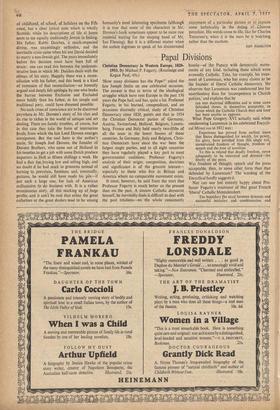No such crises of conscience are to be discerned anywhere
-in Mr. Duveen's story of his clan and its rise to riches in the world of antique and art dealing. There are family troubles, of course, but in this case they take the form of internecine -feuds, from which the late Lord Duveen emerges Omnipotent. But the real hero is the author's uncle, Sir Joseph Joel Duveen, the founder of Duveen Brothers, who came out of Holland in his twenties to get a job with some Dutch produce importers in Hull at fifteen shillings a week. He had a flair for. buying low and selling high, and no doubt if he had stuck to groceries instead of turning to porcelain, furniture and, eventually, pictures, he would still have made his pile—if not such a large one, for lack of American millionaires to dp business with. It is a rather monotonous story. all this stacking up of huge profits, and it can't be said that either the great collectors or the great dealers tend to be among humanity's most interesting specimens (although it is true that some of the characters in Mr. Duveen's book sometimes appear to be mere raw material Waiting for the shaping hand of Mr. Ian Fleming). But it is a different matter when the author digresses to speak of his disinterested enjoyment of a particular picture or to explain some technicality in the dating. of Chinese porcelain. His words come to life, like Sir Charles Tennyson's, when it is the stars he is watching rather than the markets.
LAIN HAMILTON












































 Previous page
Previous page